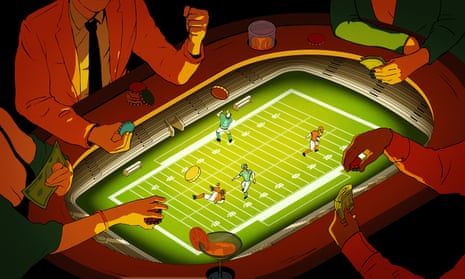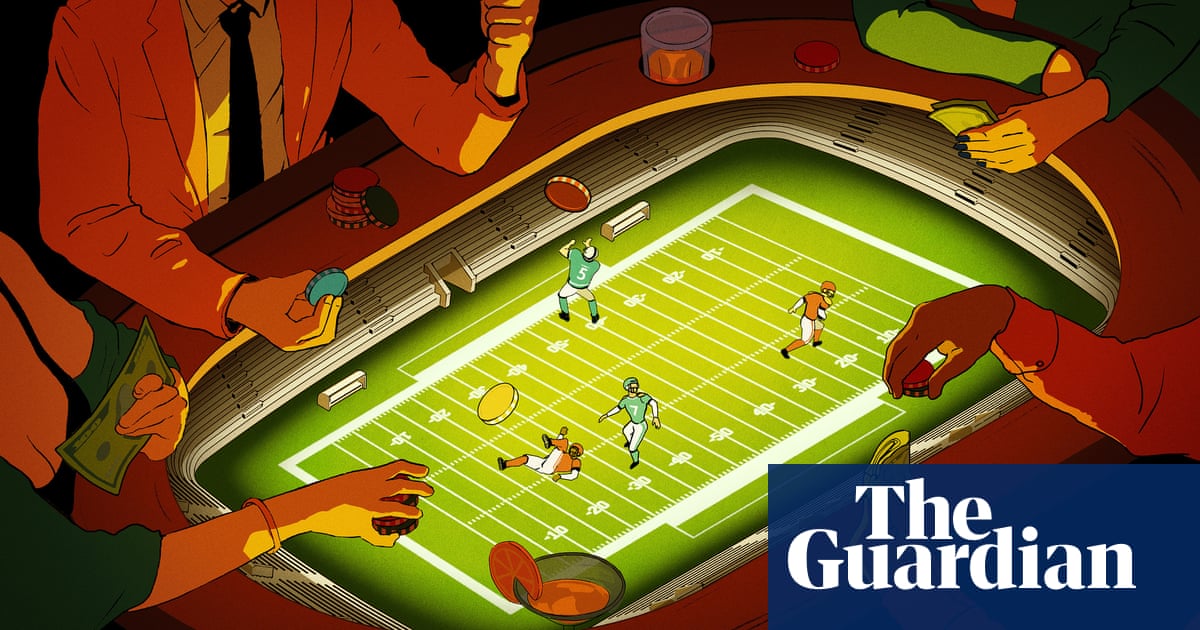
‘A target on their back’: college athletes face wave of abuse amid gambling boom
Some states are moving to ban ‘proposition bets’, a type of side wager, but big firms are lobbying against it
College athletes are facing “significant abuse” amid a surge in harassment unleashed by America’s gambling boom, according to US sports officials who say students are increasingly subject to death threats, harassment and demands for money.
A handful of state regulators have moved to ban legal gambling platforms from offering certain types of bets on collegiate sports as a result of the “inherently problematic” surge in harassment of college athletes online, at venues and in dorms.
But some of the gambling sector’s biggest players have lobbied against these moves, according to documents seen by the Guardian – claiming such restrictions pose a “far more significant” risk.
The National Collegiate Athletics Association (NCAA) is calling for a ban on “proposition bets” – prop bets – linked to specific student athletes. These side wagers – the first player to score a touchdown, for example – are not directly tied to a game’s final result.
For student athletes as young as 18, prop bets “put a target on their back”, said Clint Hangebrauck, managing director of enterprise risk management at the NCAA, and leave them “much more susceptible to receive harassment”.
As gambling exploded across college campuses, harassment has “really steadily increased in almost direct correlation with the steady increase of legalized sports betting in America”, Hangebrauck said in an interview. “It’s really been an unfortunate growing phenomenon.”
Officials are particularly concerned about the safety of athletes and the integrity of games, beyond the bright lights of collegiate sports’ top tiers. “This is not just happening at the elite levels,” said John Parsons, interim senior vice-president of the NCAA’s Sport Science Institute. “This is happening across all of our divisions.”
Sports betting is now legal across 38 states. Each time a state legalized the activity, the NCAA has seen a notable increase in students and coaches in the region facing abuse, according to Hangebrauck.
He described a wave of “highly negative and critical messages” aimed at students, officials and coaches that he claimed had a “direct” link to sports betting. “There’s no doubt the nexus of how this abuse is generated is somebody angry because they lost a bet.”
‘They don’t deserve that’
Four states have this year banned prop bets on specific collegiate athletes. Ohio was first, in February.
The previous year, a prominent college basketball coach in the state had broken from his typical postgame recap to issue a blunt intervention. “I have to say something because I think it’s just necessary at this point,” Anthony Grant, coach of the Dayton Flyers, remarked at a press conference in January 2023.
Urging fans to remember “we’re dealing with 18, 21, 22 year-olds”, he said: “There’s some laws that have recently been enacted, that really to me – it could really change the landscape of what college sports is all about. And when we have people that make it about themselves and attack kids because of their own agenda, it sickens me. They have families. They don’t deserve that. Mental health is real.”
Grant was prompted to speak out when, following a game, his team received a torrent of abuse on social media from bettors. Sports gambling had been legal in Ohio for just 16 days.
This case did not prove to be an outlier. The Ohio Casino Control Commission started to hear “a lot” about student athletes “getting Venmo requests from their peers when they lost a game, or didn’t make a free throw”, Amanda Blackford, its director of operations, told the Guardian.
There has “certainly been a shift” since sports betting was legalized, according to Blackford. “Social media’s always been rough for athletes,” she said. “But it was never about money, or the bets they were making.”
Betting firms push back
After a request from the NCAA, the Ohio commission scrutinized the prop betting market around collegiate sports and concluded a ban on student-specific prop bets would be a sound trade-off, Blackford explained: between a “hopefully minimal” impact on sports betting firms’ profits, and a “potentially significantly larger” impact on the safety and wellbeing of young athletes.
But the industry pushed back. A string of legal gambling firms lobbied the state to reconsider.
Penn Entertainment, which struck a deal with Disney to wrap ESPN, the biggest brand in US sports broadcasting, around its wagering platform, cautioned a ban “may serve only to push these wagers” to the illegal market, which it said would constitute a “far more significant” risk than the status quo.
In a joint letter BetMGM, DraftKings, FanDuel and Fanatics – four of America’s dominant sports betting groups – suggested a ban “could in fact increase” problems. College athletes and their sports are “better protected in the light of licensed sports wagering than in the darkness of illegal gambling”, the firms argued.
Penn Entertainment and BetMGM did not respond to requests for comment on whether they commissioned any analysis which prompted these warnings. FanDuel, DraftKings and Fanatics declined to comment.
Hangebrauck expressed skepticism over the warnings. “If you have data that supports that, pray tell,” he said. “We really haven’t seen anything that’s supportive of it.”
Ohio plowed ahead, confident that removing prop bets on students from legal gambling platforms will reduce harassment. “Having it as an illegal activity hopefully means they don’t feel like they can openly come after athletes in the way that they have,” said Blackford.
With the latest college football season now in full swing, the operators did not comment on whether issues had increased as a result of Ohio’s ban, as they cautioned could happen.
‘We can’t put our head in the sand’
Do betting firms agree that harassment has worsened since legalization? “Individuals who harass athletes, amateur or professional, over a sports bet should not be tolerated,” said Joe Maloney, senior vice-president at the American Gaming Association, a gambling industry lobby group. “Importantly, the legal sports wagering market is providing the transparency critical to discuss solutions to reducing player harassment for the first time – an opportunity illegal market actors do not provide.”
After Ohio, Maryland, Vermont and Louisiana introduced their own bans on student-based prop bets in college sports.
Unlike these states, Massachusetts did not allow such wagers when it legalized sports betting in the first place. “These are kids,” Jordan Maynard, interim chair of the state’s gaming commission, said this summer.
At a conference organized in July by the National Council on Problem Gambling, Maynard gave a frank assessment of gambling’s impact on college sports. “We’ve all been at these games. Don’t lie – to yourself, or to anybody else,” he said. “The people screaming at these kids, this has gotten worse since sports wagering passed … We can’t put our head in the sand and say it’s not an issue.”
But operators, the moderator suggested, would likely argue that banning legal prop bets on collegiate athletes will drive gamblers to illegal sports books. “I have a lot of thoughts on the boogie man,” Maynard replied.
‘I hope your dog gets cancer’
“Even if you just go to a game, it’s so prevalent now that you just overlook it,” said Ricardo Hill, basketball coach at Indian Hill high school in Ohio. “You can hear it at every game.”
His former players, having reached college, are now grappling with the impact of gambling on their sports. Several have described to him “how the fans are harassing them”, Hill told the Guardian.
In a new statewide campaign, collegiate athletes in Ohio read out the messages they have been sent. “You deserve to get unalive for blowing my bet,” said one received by Tyler, a pre-law student. “You cost me two grand,” read a message sent to another student, “I hope your dog gets cancer.”
Officials hope the campaign, More Than a Bet, will make gamblers think twice before sending abusive messages.
Hill has seen enough. As far as he’s concerned, gambling and college sports should not go together. “It’s too dangerous and too risky for the collegiate athletes.”
“Sportsbetting is a billion-dollar industry,” he said. “That’s what’s driving the changes. Unfortunately the athletes are on the bottom of the totem in decision making.”
‘It’s not something we condone’
As the Guardian reported this story, the Responsible Online Gaming Association (ROGA)– a new body formed by betting firms – announced plans to roll out an education program next year, with videos and events for students.
Several operators that declined to comment on the issues unfolding around college sports referred the Guardian to ROGA. Does the association – or the gambling companies behind it – agree with the NCAA, regulators, coaches and students who say harassment has increased markedly since sports betting’s legalization?
“I don’t know we have enough information to make that judgment,” said Jennifer Shatley, executive director of ROGA. “I will say that perception does point to the importance of responsible gaming, and having these types of programs in the first place.”
Harassment of student athletes “is sort of outside the realm of what we’re doing”, she added. “However, I will say obviously it’s not something we condone.”
Operators have invested in ads and marketing around “responsible gaming”, reminding gamblers to bet responsibly. Critics argue this approach overlooks those at risk of developing gambling problems, and shifts responsibility away from the industry.
“Everybody involved in legalized gambling has some responsibility – be it governments, be it operators, be it the players,” said Shatley. “Everybody has a shared responsibility.
“So it’s really [about] making sure we’re all fulfilling our own responsibilities. But absolutely, everyone that’s involved in the industry has a responsibility.”
